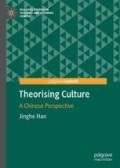Abstract
This chapter begins from the standpoint of Western theories and definitions of, ‘What is culture?’ Although a brief review, the complexities around defining culture are apparent and significant. It is then contended that Western theorisation of culture was not appropriate in the context of the research informing this book. Based on the assumption that generation and development of theories in humanity and social science is not free of context (e.g. political, historical, geographical), cultural theories developed in multicultural democratic contexts may not have the same relevance as those locally developed to analyse the phenomena of a hegemonic nation. Thus engaging Chinese concepts and theorising of culture is offered as an alternative perspective to the norm of Western dominant theorising and conceptualisation, which has provided one-way generalist cultural views. The theoretical underpinnings for this approach and the methodology of the research are included and followed by an outline of the structure of the book.
Access this chapter
Tax calculation will be finalised at checkout
Purchases are for personal use only
References
Dervin, F. (2014). Cultural representation, identity and othering. In J. Jackson (Ed.), The Routledge handbook of language and intercultural communication. London/New York: Routledge.
Dervin, F. (2015, November). Intercultural competences in teacher education: An example from Finland. Combined Symposium of the School of Education & IEC, Linguistics, Macquarie University, Sydney.
DiMaggio, P. (1997). Culture and cognition. Annual Review of Sociology, 23, 263–287. https://doi.org/10.1146/annurev.soc.23.1.263.
Easton, G. (2010). Critical realism in case study research. Industrial Marketing Management, 39(1), 118–128. https://doi.org/10.1016/j.indmarman.2008.06.004.
Elam, Y. (2012). Defining culture and dealing with meaning. Journal of Culture Analysis, 1, 1–30.
Elliot, T. S. (1948). Notes towards the definition of culture. London: Faber and Faber.
Flyvbjerg, B. (2006). Five misunderstandings about case-study research. Qualitative Inquiry, 12(2), 219–245. https://doi.org/10.1177/1077800405284363.
Geertz, C. (1973). The interpretation of cultures: Selected essays. New York: Basic Books.
Ginzberg, E. (2016). Seeking order in chaos: A definition of culture. GSTF Journal of Law and Social Sciences, 5(2), 19–31. Retrieved from http://dl6.globalstf.org/index.php/jlss/article/view/638/584
Grillo, R. D. (2003). Cultural essentialism and cultural anxiety. Anthropology Theory, 3(2), 157–173. https://doi.org/10.1177/1463499603003002002.
Hall, S. (1996). Cultural studies: Two paradigms. In J. Storey (Ed.), What is cultural studies? A reader (pp. 31–48). London/New York: Arnold and Oxford University Press.
Jullien, F. (2014). On the universal: The uniform, the common and dialogue between cultures. Cambridge: Polity Press.
Kroeber, A. L., & Kluckhohn, C. (1952). Culture: A critical review of concepts and definitions. Cambridge, MA: Harvard University Press.
Kuper, A. (1994). The chosen primate: Human nature and cultural diversity. Cambridge, MA: Harvard University Press.
Kuper, A. (1999). Culture, the anthropologists’ account. Cambridge: Harvard University Press.
Lampert, A. (2012). The nature of culture. Journal of Culture Analysis, 1, 101–112.
Matthes, E. (2016). Cultural appropriation without cultural essentialism? Social Theory and Practice, 42(2), 343–366. https://doi.org/10.5840/soctheorpract201642219.
Mautner, M. (2012). Culture. Journal of Culture Analysis, 1, 31–66.
Secombe, M., & Smolicz, J. (2015). Globalisation, cultural diversity and multiculturalism: Australia. In J. Zajda (Ed.), Second international handbook on globalisation, education and policy research (pp. 207–220). Dordrecht: Springer.
Sewell, W. H. (1999). The concept(s) of culture. In V. E. Bonnell & L. Hunt (Eds.), Beyond the cultural turn: New directions in the study of society and culture (pp. 35–61). Berkeley/Los Angeles: University of California Press.
Singh, M., & Han, J. (2017). Pedagogies for internationalising research education: Intellectual equality, theoretic-linguistic diversity, and knowledge Chuangxin. Singapore: Springer.
Singh, M., & Meng, H. (2013). Democratising western research using non-western theories: Rancière and mute Chinese theoretical tools. Studies in Higher Education, 38(6), 907–920.
Smolicz, J. (1988). Tradition, core values and intercultural development in plural societies. Ethnic and Racial Studies, 11(4), 387–410. https://doi.org/10.1080/01419870.1988.9993612.
Smolicz, J. (1999). Core values and cultural identity. In M. J. Secombe & J. Zajda (Eds.), J. Smolicz on education and culture (pp. 105–123). Melbourne: James Nicholas Publishers.
Swartz, D. (1997). Culture and power: The sociology of Pierre Bourdieu. Chicago/London: University of Chicago Press.
White, L. I. (1975). The concept of cultural systems: A key to understanding tribes and nations. New York/London: Columbia University Press.
Williams, R. (1997). Culture is ordinary. In A. Gray & J. McGuigan (Eds.), Studying culture: An introductory reader (pp. 5–14). London/New York: Arnold.
Young, J. (2008). Cultural appropriation and the arts. Oxford: Blackwell.
Author information
Authors and Affiliations
Corresponding author
Rights and permissions
Copyright information
© 2020 The Author(s)
About this chapter
Cite this chapter
Han, J. (2020). Introduction. In: Theorising Culture. Palgrave Studies in Teaching and Learning Chinese. Palgrave Pivot, Cham. https://doi.org/10.1007/978-3-030-23880-3_1
Download citation
DOI: https://doi.org/10.1007/978-3-030-23880-3_1
Published:
Publisher Name: Palgrave Pivot, Cham
Print ISBN: 978-3-030-23879-7
Online ISBN: 978-3-030-23880-3
eBook Packages: Social SciencesSocial Sciences (R0)

